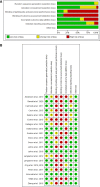Effects of mindfulness-based stress reduction on adults with sleep disturbance: an updated systematic review and meta-analysis
- PMID: 36332952
- PMCID: PMC9639069
- DOI: 10.1136/bmjopen-2021-058032
Effects of mindfulness-based stress reduction on adults with sleep disturbance: an updated systematic review and meta-analysis
Abstract
Objective: Mindfulness-based stress reduction (MBSR) is a meditation-based therapy originally recommended for stress management. However, it is currently used to alleviate sleep disturbances. Therefore, this contemporary systematic review aimed to elucidate the clinical effects of MBSR on sleep quality and sleep-related daytime impairment in adults with sleep disturbances, including chronic insomnia disorders.
Design: Systematic review and meta-analysis of randomised controlled trials (RCTs).
Methods: A comprehensive search was conducted using the following databases: Ovid MEDLINE, AMED, Ovidembase, PsycINFO, Cochrane Library, CINAHL, and four domestic databases: KoreaMed, KISS, KMbase and NDSL. The final search update was performed in June 2022. Two researchers independently selected relevant studies, assessed the risk of bias and extracted the data.
Results: Of the 7516 records searched, 20 RCTs and 21 reports were included. In the subgroup analysis, MBSR did not improve objective or subjective sleep quality in chronic insomnia and cancers. However, MBSR versus waitlist control might have been effective in improving subjective sleep quality, but with substantial heterogeneity (standardised mean difference=-0.32; 95% CI: -0.56 to -0.08; I2=71%). In addition, MBSR compared with active control did not improve the sleep-related daytime impairments including depression, anxiety, stress, fatigue and quality of life. The overall risk of bias included in this review was a concern because of performance and detection bias.
Conclusions: MBSR might be ineffective for improving sleep quality in patients with chronic insomnia and cancers. In addition, more than half of the RCTs included in this review had small sample sizes and were vulnerable to performance and detection biases. Therefore, well-designed RCTs with larger sample sizes are required to confirm the clinical effects of MBSR in adults with sleep disturbances.
Prospero registration number: CRD42015027963.
Keywords: complementary medicine; primary care; sleep medicine.
© Author(s) (or their employer(s)) 2022. Re-use permitted under CC BY-NC. No commercial re-use. See rights and permissions. Published by BMJ.
Conflict of interest statement
Competing interests: None declared.
Figures



References
-
- Cormier RE. Sleep disturbances. In: Walker HK, Hall WD, Hurst JW, eds. Clinical methods: the history, physical, and laboratory examinations. 3rd edn. Boston: Butter worths, 1990. - PubMed
Publication types
MeSH terms
LinkOut - more resources
Full Text Sources
Medical
